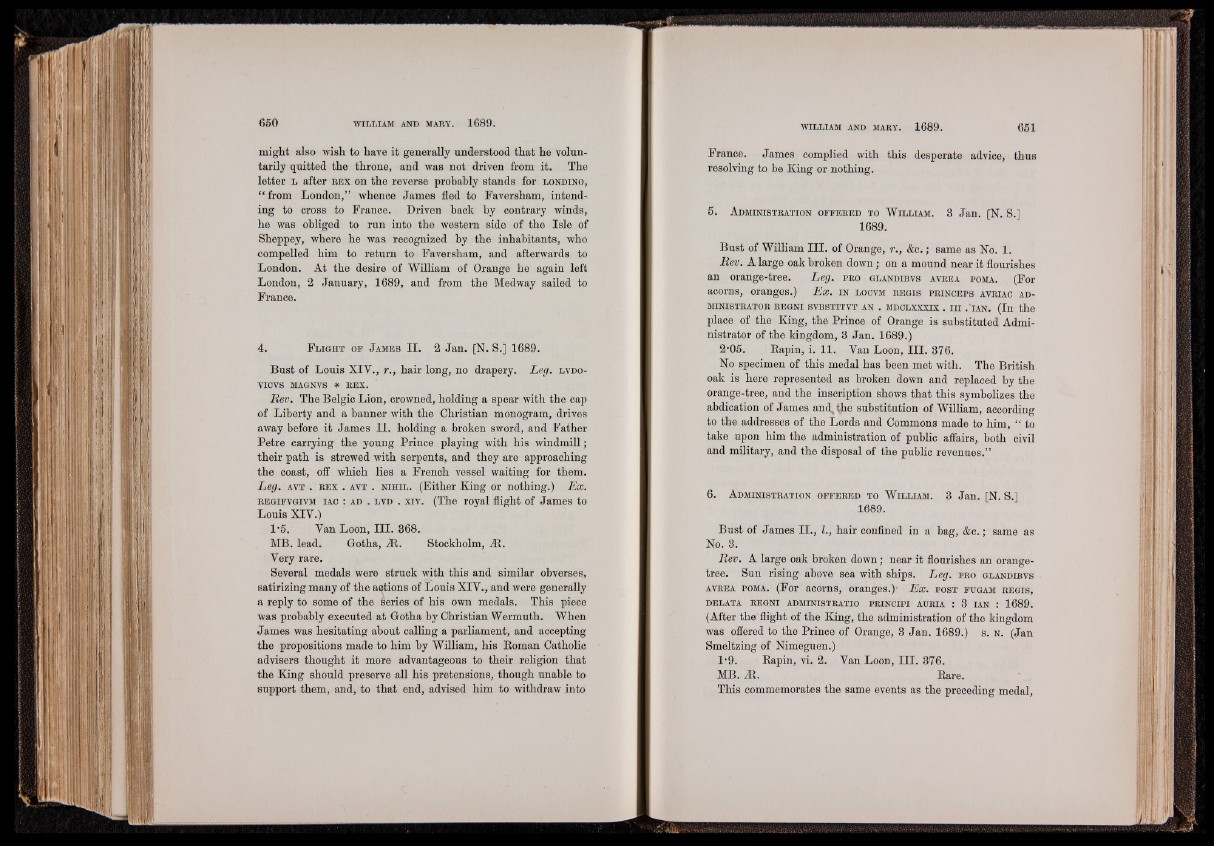
might also wish to have it generally understood that he voluntarily
quitted the throne, and was not driven from it. The
letter l after r e x on the reverse probably stands for lo n d in o ,
“ from London,” whence James fled to Faversham, intending
to cross to France. Driven back by contrary winds,
he was obliged to run into the western side of the Isle of
Sheppey, where he was recognized by the inhabitants, who
compelled him to return to Faversham, and afterwards to
London. At the desire of William of Orange he again left
London, 2 January, 1689, and from the Medway sailed to
France.
4. F lig h t o f James II. 2 Jan. [N. S.] 1689.
Bust of Louis XIV., r., hair long, no drapery. Leg. lv d o -
VICVS MAGNVS * REX.
Rev. The Belgic Lion, crowned, holding a spear with the cap
of Liberty and a banner with the Christian monogram, drives
away before it James II. holding a broken sword, and Father
Petre carrying the young Prince playing with his windmill;
their path is strewed with serpents, and they are approaching
the coast, off which lies a French vessel waiting for them.
Leg. avt . r e x . avt . n ih il . (Either King or nothing.) Ex.
r e g if v g iv m IAO : ad . lv d . xiv. (The royal flight of James to
Louis XIV.)
1-5. Van Loon, III. 868.
MB. lead. Gotha, A . Stockholm, At.
Very rare.
Several medals were struck with this and similar obverses,
satirizing many of the actions of Louis XIV., and were generally
a reply to some of the series of his own medals. This piece
was probably executed at Gotha by Christian Wermuth. When
James was hesitating about calling a parliament, and accepting
the propositions made to him by William, his Roman Catholic
advisers thought it more advantageous to their religion that
the King should preserve all his pretensions, though unable to
support them, and, to that end, advised him to withdraw into
France. James complied with this desperate advice, thus
resolving to be King or nothing.
5. Administration offered to William. 3 Jan. [N. S.]
1689.
Bust of William III. of Orange, r., &c.; same as No. 1.
Rev. A large oak broken down; on a mound near it flourishes
an orange-tree. Leg. pr o gla n d ibv s avrea poma. (For
acorns, oranges.) Ex. in loovm r e g is p r in c e p s avriac adm
in is t r a t o r REGNI SVBSTITVT AN . MDCLXXXIX . I l l . ’IAN. (In the
place of the King, the Prince of Orange is substituted Administrator
of the kingdom, 3 Jan. 1689.)
2’05. Rapin, i. 11. Van Loon, III. 376.
No specimen of this medal has been met with. The British
oak is here represented as broken down and replaced by the
orange-tree, and the inscription shows that this symbolizes the
abdication of James and^ the substitution of William, according
to the addresses of the Lords and Commons made to him, “ to
take upon him the administration of public affairs, both civil
and military, and the disposal of the public revenues.”
6. Administration offered to William. 3 Jan. [N. S.]
1689.
Bust of James II., I., hair confined in a bag, &c.; same as
No. 3.
Rev. A large oak broken down; near it flourishes an orange-
tree. Sun rising above sea with ships. Leg. pr o glandibvs
avrea poma. (For acorns, oranges.)’ Ex. po s t fugam r e g is ,
DELATA REGNI ADMINISTRATED PRINCIPI AURIA : 3 IAN : 1689.
(After the flight of the King, the administration of the kingdom
was offered to the Prince of Orange, 3 Jan. 1689.) s. N. (Jan
Smeltzing of Nimeguen.)
1’9. Rapin, vi. 2. Van Loon, III. 876.
MB. At. Rare.
This commemorates the same events as the preceding medal,